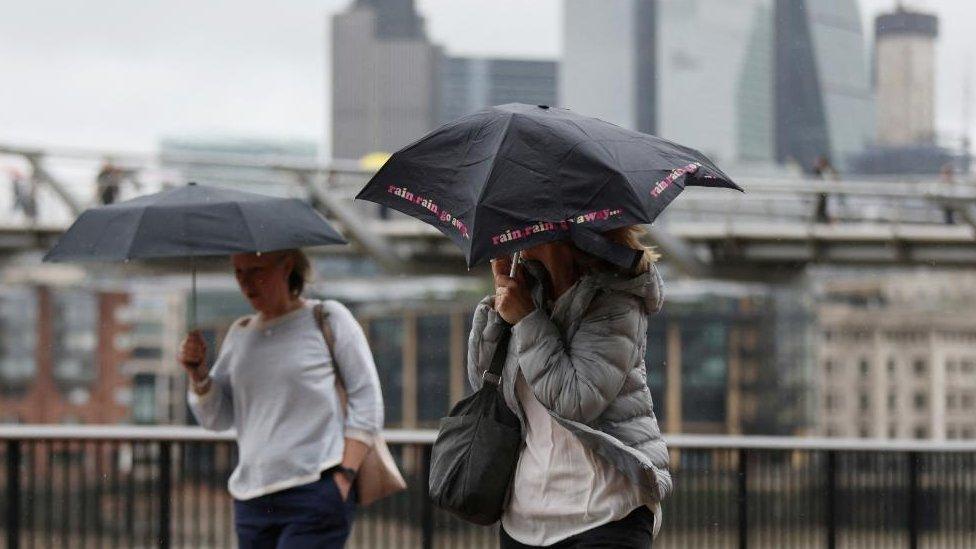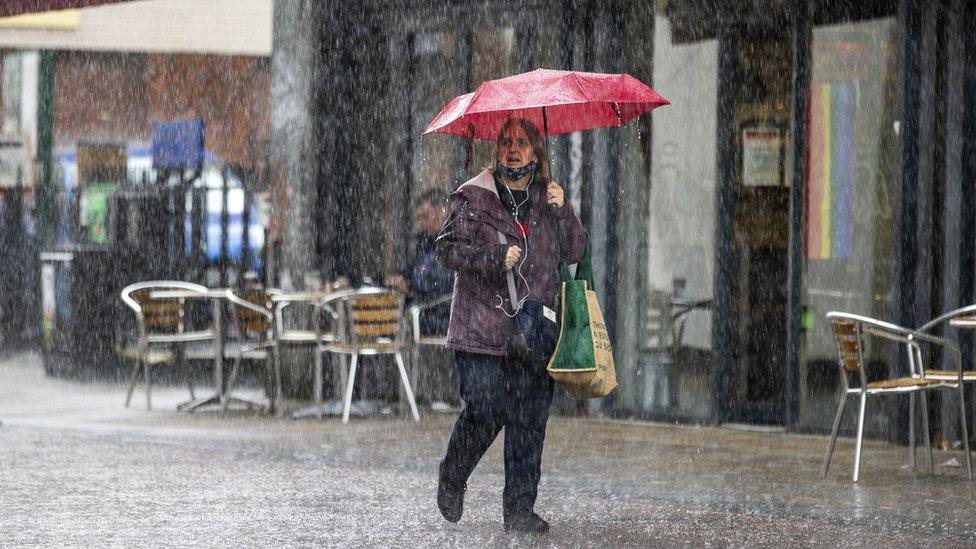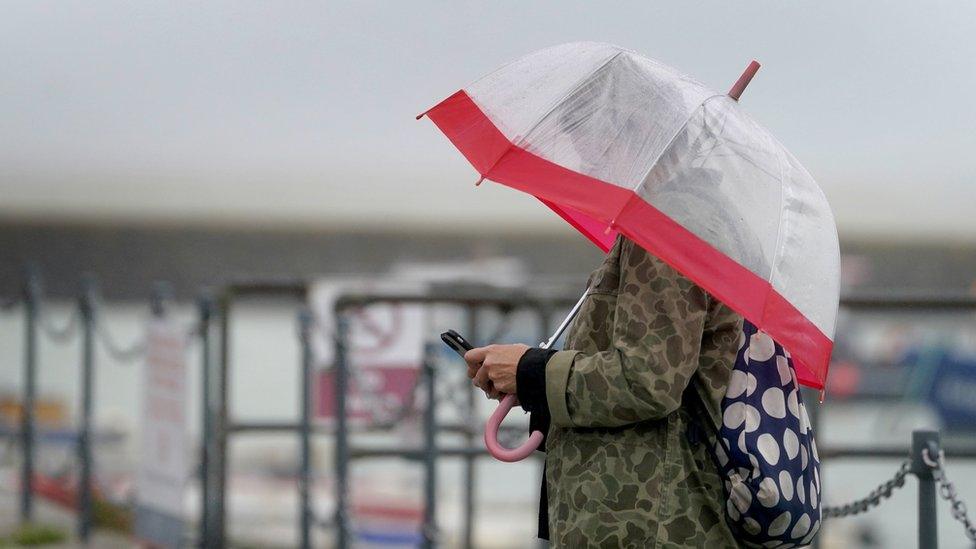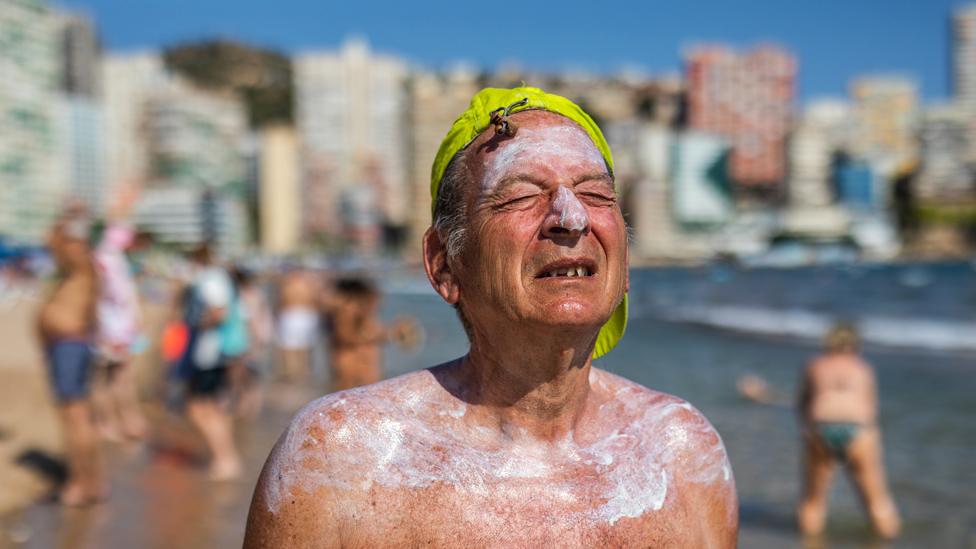UK weather: Storm and wind warnings for England and Wales as NI sees wettest July
- Published

Weather warnings are in place across England and Wales on Wednesday as the UK's wet and windy weather continues.
A yellow alert for storms stretching from London to Manchester, covering much of the Midlands and Wales, will last from 09:00 to 19:00 BST.
Another yellow warning is in place throughout the day for strong wind due to hit the south coast of England.
The Met Office confirmed last month was one of the wettest Julys on record, according to provisional data.
It said the UK had its sixth rainiest July since data started being collected, and its wettest since 2009, with 140.1mm of rainfall, more than two thirds higher than the average for this time of year.
Northern Ireland has had its wettest July on record, the Met Office data shows. The region saw more than double its average rainfall (185.4mm).
And Greater Manchester, Lancashire and Merseyside also saw their wettest July since records began, all seeing long periods of rain.
Rain, wind and cool temperatures have dominated the forecast in recent weeks - in stark contrast to the dangerous heatwave sweeping much of Europe.
Meteorologists say the wet and cool weather is due to the position of the jet stream, a core of strong winds sitting about five to seven miles above the Earth's surface, and which dictate much of the UK's weather.
The jet stream marks the boundary of cold air to the north in the polar regions and hot air to the south, a contrast which produces pressure differences.
Last year, the jet stream was positioned further north, so the UK saw warm and dry weather created by the high-pressure system sitting over the country.
But this month, the jet stream has been stuck to the south of the UK, meaning its low-pressure system has been bringing cold and wet weather.
The weather has forced some summer festivals and events to cancel in recent weeks, including the Tiree Music Festival, a folk event held on the island of Tiree off Scotland's west coast.
Around 600 members of staff, volunteers and ticket holders were already on the remote island when powerful winds meant it had to be cancelled at the last minute.
Co-founder Daniel Gillespie told BBC News: "We thought we might be able to be able to continue but once the winds strengthened and forecasts got worse, we had to start to evacuate.
"The festival takes a year of planning and then it all goes down the drain in a matter of days, but we had a good plan in place.
"We also had families on the island turning up to the site in their cars and taking campers home to crash on their couches."
He said he was confident the event will be back next year, but said cancellations have knock-on impacts for performers and businesses and called predictions of more extreme summer weather in the future "concerning" for people who organise outdoor events.
A number of local events have been forced to cancel, including the Penarth Summer Festival in south Wales, which attracts visitors from around the UK for its downhill homemade go-kart race.
Nick McDonald from Penarth Town Council said the 60-year-old festival is a boost for local businesses and "is meant to signal the start of the summer holidays" - but instead was cancelled because of a weather warning for high winds.
The wet weather has also hit domestic holidaymakers. Stephen Felce from Hertfordshire said he cancelled his 10-day trip to Cornwall after seeing heavy rain predicted throughout.
The 79-year-old told the BBC he decided to stay at home because heavy rain was forecast "on all but two days of 10, and I just thought you can put up with so much, but that's a bit too much."
Emma McClarkin, chief executive of the British Beer and Pub Association, said pubs haven't had the "boost" of sunny weather this month.
She told BBC News: "We hope people will support their local or visit a new pub on their holidays whatever the weather, but we'll be keeping our fingers crossed for more sun before summer's over."

A woman shelters under an umbrella during a heavy downpour of rain in Belfast
Some scientists think that higher temperatures due to climate change in the Arctic - which has warmed more than four times faster than the global average - are causing the jet stream to slow, increasing the likelihood of high pressure and hot weather remaining in place.
Global warming means hot temperatures and wetter periods will become more typical for the UK.
Hotter air is able to hold more moisture - and it falls back to ground in heavy downpours.
A recent study from the UK Met Office and University of Bristol, published in March, found that the intensity of downpours can increase by up to 15% for every degree of global warming.
Global temperatures are expected to climb by 2.4C by the end of the century based on projected emissions levels.
While the rainfall has eased some of the pressure on natural water sources after last year's droughts and a dry May and June this year, Steve Turner from the UK Centre for Ecology and Hydrology told the BBC that a wet July won't totally replenish rivers and lakes.
He said: "This unsettled weather in the short term will have eased the pressure on the environment, but there are some areas still seeing ecological stress following the very dry summer last year.
"Because the summer last year was so severe, although we have had some rain, it just takes a longer time to replenish that and get back to normal."
He added that intense rainfall can increase the risk of river pollution.
"After our dry June and now having some more intense rainfall there will have been some run off from the land and potentially some water quality issues but we don't yet have data to confirm this," he said.
Ireland has seen its wettest July on record, according to provisional data gathered by the Irish Meteorological Service, with more than four times the amount of rain falling this month than in July 2022.
Related topics
- Published31 July 2023

- Published31 July 2023

- Published3 July 2023
